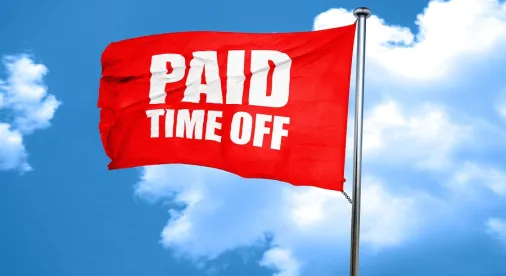California recently enacted Assembly Bill 1867, requiring all private employers with 500 or more employees to provide COVID-19 supplemental paid sick leave for their California employees. Employers must begin providing supplemental sick leave, under the new law, no later than September 19, 2020. The law will remain in effect until the later of December 31, 2020 or expiration of any federal extension of the Families First Coronavirus Response Act.
Who Must Provide Supplemental Paid Sick Leave?
The new law is aimed at expanding supplemental paid sick leave to private employers not covered under similar state and federal laws. The federal Families First Coronavirus Response Act (FFCRA) authorizes certain paid sick leave benefits but only applies to employers with fewer than 500 employees. This new law, AB 1867, applies to all private California employers with 500 or more employees in the United States, and to public and private employers of first responders and health care employees who elected not to provide leave under the FFCRA.
Who Is Eligible for Supplemental Paid Sick Leave?
AB 1867 applies to all California employees who must leave their home to perform work for a covered employer. Such employees are entitled to supplemental paid sick leave if they are unable to work due to any of the following:
- The covered worker is subject to a federal, state, or local quarantine or isolation order related to COVID-19.
- The covered worker is advised by a health care provider to self-quarantine or self-isolate due to concerns related to COVID-19.
- The covered worker is prohibited from working by the covered worker’s hiring entity due to health concerns related to the potential transmission of COVID-19.
What Is The Scope of The Supplemental Paid Sick Leave Obligation?
Covered employees are entitled to leave as follows:
- Employees are entitled to 80 hours of paid sick leave if their employer considers them “full time” or if they were scheduled to or did work on average at least 40 hours per week in the two weeks preceding the date of the leave.
- Employees with a normal weekly schedule are entitled to leave equal to the total number of hours the employee is normally scheduled to work over two weeks;
- Employees who work a variable number of hours are entitled to leave equaling 14 times the average number of hours the employee worked each day in the six months preceding the date the employee took COVID-19 supplemental paid sick leave; or
- Employees who work a variable number of hours and have worked for a period of 14 or fewer days are entitled to leave equaling the total number of hours the employee has worked for that employer.
- Each hour must be compensated at a rate equal to the highest of the employee’s regular rate of pay for their last pay period, the state minimum wage, or the local minimum wage. An employer’s maximum obligation cannot surpass $511/day and $5,110 in total.Are Employers Required To Comply With Any Notice Requirements?Yes. Employers must include notice of the amount of supplemental sick leave available in an employee’s wage statement or in a separate writing provided on the designated pay date with the employee’s payment of wages. This requirement becomes effective on the next full pay period following the date of enactment.Employers also must display a poster explaining the available COVID-19 supplemental sick pay leave. The California Labor Commission has provided a poster for this purpose that can be found here for non-food sector workers.Can An Employer Offset Their Obligation Using Other Benefits?
Supplemental paid sick leave under the new law is provided in addition to paid sick leave accrued by employees under state law pursuant to California Labor Code section 246. The law prohibits employers from requiring an employee to use any other paid or unpaid leave, paid time off, or vacation time before using supplemental paid sick leave or in lieu of supplemental paid sick leave.
However, an employer may not be required to provide supplemental paid sick leave in addition to certain other supplemental benefits previously provided. To offset the requirements under the new law, these supplemental benefits (1) must be payable for the same reasons as those provided under AB 1867, and (2) must compensate the employee in an amount equal to or greater than the amount provided under the law. In addition, if the employer previously provided paid sick leave at lower rates than required under the law (or provided unpaid leave), they may retroactively provide supplemental pay to meet their obligations under the new law, and do not need to provide additional leave time.
What Are The Penalties If An Employer Does Not Comply With The New Law?
If COVID-19 supplemental paid sick leave is unlawfully withheld, an employer may be subject to an administrative penalty of at least $250 per day, but not to exceed $4,000 in the aggregate. The Labor Commissioner or the Attorney General may also bring a civil action to collect other legal or equitable relief, including reinstatement, back pay, the payment of sick days unlawfully withheld, and liquidated damages.
Does This New Law Supersede The Executive Order Providing Supplemental Sick Pay For Food Sector Workers?
Previously, California’s Governor issued an Executive Order, that requires employers in the food sector industry with 500+ employees to provide COVID-19-related paid sick leave to California employees. AB 1867 codifies that prior Executive Order. Employers in the food sector industry can find the Labor Commissioner’s supplemental paid sick leave poster here.





 />i
/>i
